What is a black diamond? Are black diamonds really diamonds?
Even though black diamonds are more popular than ever, they’re extremely misunderstood. A quick search will show you the extent of black diamond confusion: most questions simply ask “What is a black diamond” and “Are black diamonds real”. This is a lot more elementary than the information sought out about the colorless diamonds you’re familiar with, so if you’re looking for black diamond engagement rings, the learning curve can feel pretty massive.
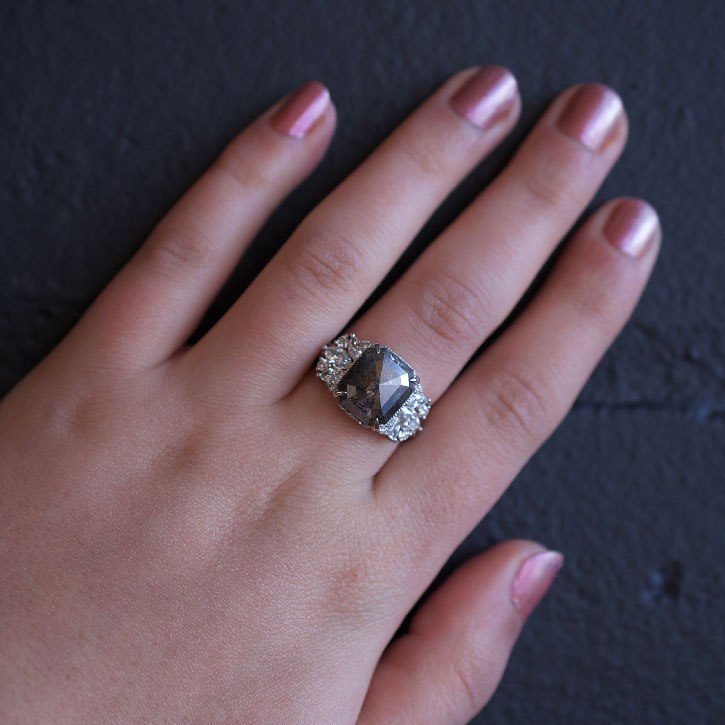
An Abby Sparks Jewelry alternative black diamond cluster engagement ring, The Ann.
As a custom jewelry designer who often sources black diamonds for clients, we can guide you through everything you need to know about these dark and moody stones so you can decide if a black diamond is the right choice for your own unique engagement ring.
What is a black diamond?
It seems like a simple question, but actually, the term black diamond can mean a few different types of stones.
![]()
A round cut and polished black diamond.
- Natural black diamonds (also called fancy black diamonds) get their color from Mother Nature. Other minerals are trapped inside the diamond during its formation in the earth. The extremely high amount of these other minerals within the diamond, called inclusions, are what give natural black diamonds their black color (you can learn more about inclusions with the Diamond Clarity Chart). The cool thing about inclusions is that these are what gives the diamond its unique character and make it unlike any other stone as no two diamonds have the same inclusions.
- Carbonados are also naturally occurring rock substances, but they’re only found in Brazil and Central Africa. Geophysicists believe these stones came from a meteorite, and they consist of carbon, graphite, and diamond.
- Black diamonds (notice the absence of “natural” or “fancy”) are found in nature, although their color is not. These are sometimes called treated black diamonds, black-colored diamonds, or color-enhanced diamonds and they’re turned black as a result of heating treatments that enhance their color from typically dark grey to black.
- Lab-created black diamonds are identical to natural diamonds but they are lab-grown, so neither the stone nor the color are found in nature.
Are black diamonds real?

The Mandi, a custom engagement ring featuring a 1.36 carat black diamond.
Yes! Black diamonds are real diamonds. Natural diamonds, Carbonados, and treated black diamonds are all found in nature. Unlike natural diamonds and Carbonados, treated black diamonds aren’t naturally black, they’re treated with heat to get their color. Black lab-grown diamonds are man-made, not mined from the earth like the others. Still, they’re the real deal: chemically and structurally identical to mined diamonds, but neither the stone nor the stone’s color comes from nature.
Are black diamonds expensive?
Black diamond cost is determined by size and origin. Fancy black diamonds and Carbonados are both extremely rare. Only one in 10,000 natural diamonds are colored diamonds and only a portion of these colored diamonds are black. Because of their scarcity, natural black diamonds and Carbonados are the some of the most valuable and most costly.

An Abby Sparks Jewelry black diamond solitaire engagement ring, The Hillary.
Most black diamonds are the market are heat-treated, and are more affordable than diamonds that are naturally black. Keep in mind though that sometimes heat treating a stone can weaken it. Heat-treated black diamonds could be weaker than natural black diamonds.
Lab-created black diamonds are also less expensive than their mined counterparts. Because they are grown with the color already in them, they are just as durable as natural diamonds. Regardless of origin, a black diamond’s value is based on the same criteria as all diamonds–the 4C’s: clarity, cut, color, and carat (see more information on diamonds and the 4C’s). Unlike colorless diamonds, clarity is based on the external conditions of the stone. But just like any other diamond, the higher the carat weight, the bigger the price tag.
Are there different black diamond colors?
Natural black diamonds and Carbonados can range from light gray to pure black depending on the extent of inclusion. Treated black diamonds and lab grown black diamonds typically have a more uniform, deep black appearance. If you’re curious about other hues, colored diamonds come in yellow, pink, blue, purple, red, orange, green, brown and more.

Rough diamonds get their color from their inclusions – minerals trapped within the carbon structure of the diamond.
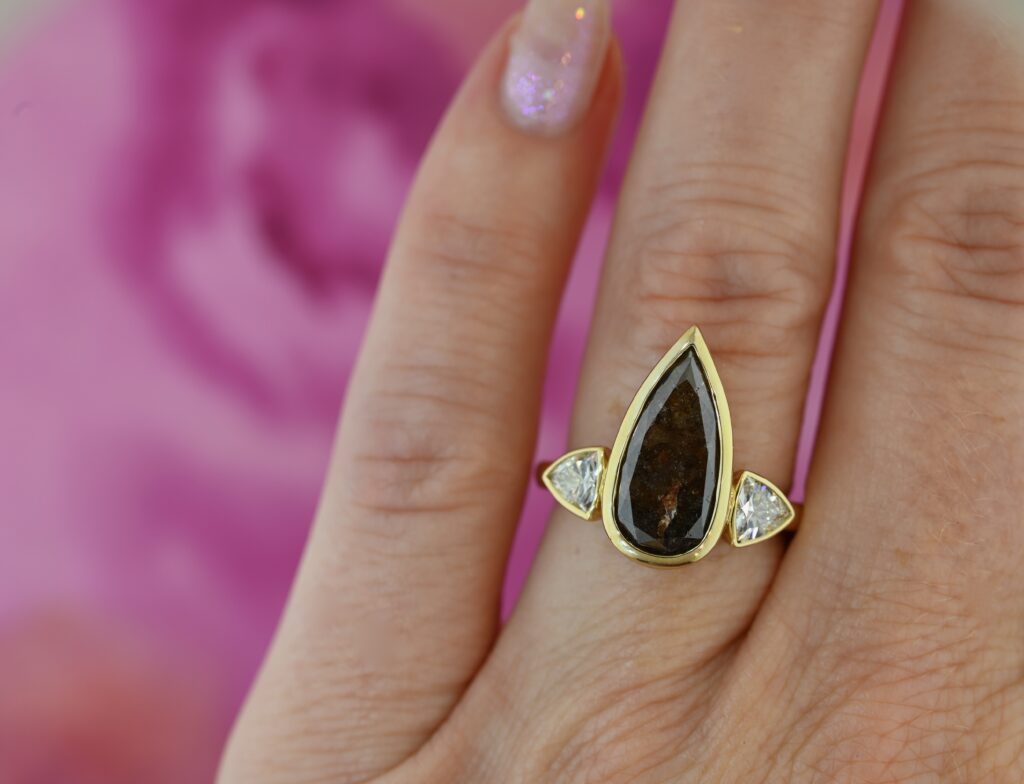
A new rough pear-cut diamond ring by Love Lore Jewelry
If you want a colored diamond with a more organic look, rough diamonds (sometimes called raw diamonds) lack the clarity of colorless diamonds and appear smoky and subdued. When these stones are cut and polished, they’re called rose cut diamonds, rough diamonds, salt and pepper diamond, or galaxy diamonds and are a major fave for unconventional brides looking for a rustic engagement ring. Although they can be “salt and pepper”, brown, green, or white, some rough diamonds are black.
Black Diamond Engagement Rings
There’s no denying that black diamond engagement rings make a bold statement. If you like their look, you can go all out and have a black diamond center stone like The Hillary, or use black diamonds as accent stones like The Sihaya. Depending on your engagement ring’s design, black diamonds can look really sleek and sophisticated set in platinum, classic in yellow gold, or natural and earthy in rose gold like The Mandi. If you want an alternative ring with a striking stone, black diamonds are an excellent choice.
Before you buy any diamond engagement ring, you need to do your research to make sure you know where your diamond is from, and how it got it’s color. Especially with black diamonds, which can be confusing. You need to work with a fine jeweler you can trust, who can source stones for you and educate you on the process. Abby Sparks Jewelry is a premier custom jeweler and specializes in custom engagement rings and diamond sourcing. If you would like to learn more about the custom design process around creating a custom engagement ring with one of these stone options, we are here to help. Feel free to reach out to our design team here, or book an appointment.

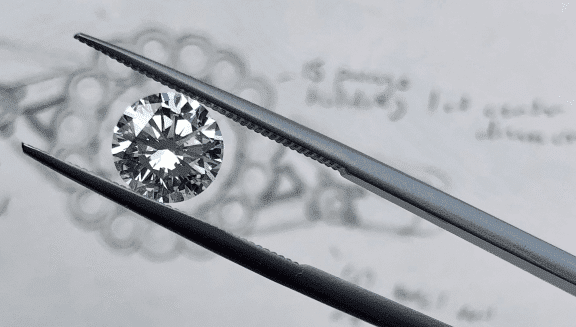
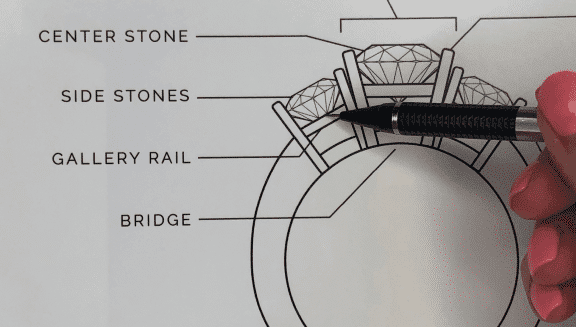

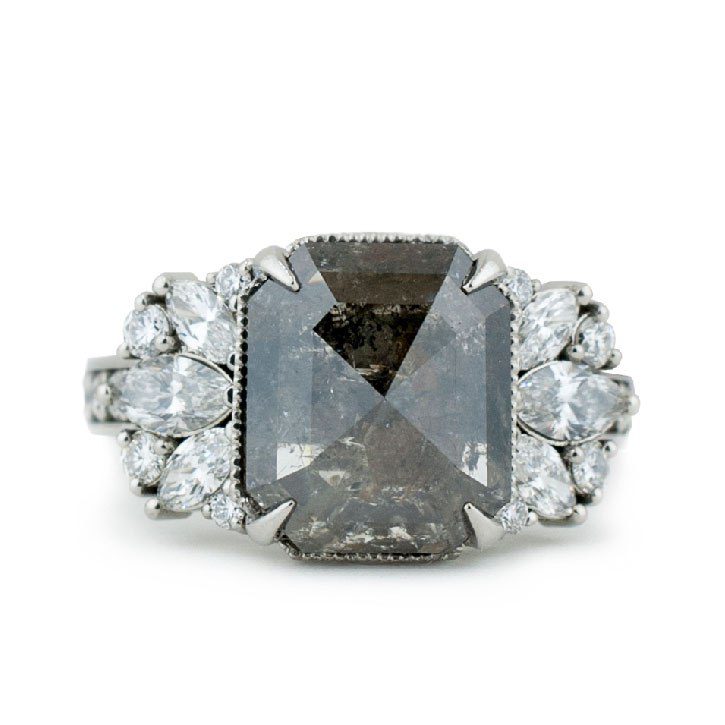

Comments